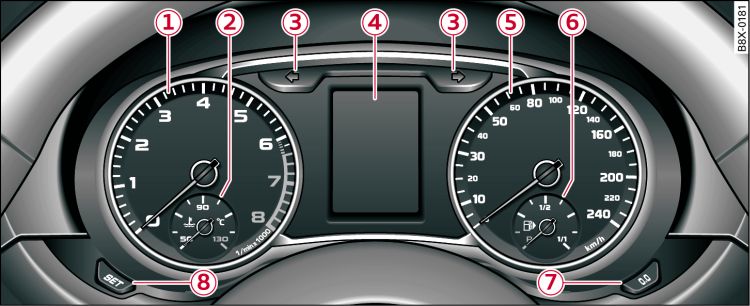
- Fig. 1 Overview of instrument cluster
There is no coolant temperature gauge on Audi A1s which do not have a driver information system*. In this case, a warning lamp  Link will be the sole indication if the coolant temperature is too high. Please refer to Caution!.
Link will be the sole indication if the coolant temperature is too high. Please refer to Caution!.
 Link will be the sole indication if the coolant temperature is too high. Please refer to Caution!.
Link will be the sole indication if the coolant temperature is too high. Please refer to Caution!.The coolant temperature gauge -2- Fig. 1 only works when the ignition is switched on. In order to avoid possible damage to the engine, please read the following notes for the different temperature ranges.
Engine cold
If the needle is still in the lower range of the dial, this indicates that the engine has not yet reached operating temperature. In this case, avoid high engine speeds, full acceleration and heavy engine loads.
Normal temperature
In normal operation the needle will settle somewhere in the centre of the dial once the engine has reached operating temperature. The needle may also go further over to the right when the engine is working hard at high outside temperatures. This is no cause for concern, provided the warning lamp  does not light up in the instrument cluster.
does not light up in the instrument cluster.
 does not light up in the instrument cluster.
does not light up in the instrument cluster.Hot zone
If the needle is over to the far right on the dial, this means the coolant temperature is too high. In addition, the warning lamp  Link will light up.
Link will light up.
 Link will light up.
Link will light up.- If your Audi A1 does not have a coolant temperature gauge, apply the following rule of thumb to ensure that your engine enjoys a long service life: avoid high engine speeds, full acceleration and heavy engine loads for about 15 minutes after starting a cold engine. The amount of time the engine takes to warm up depends on the outside temperature and the type of engine. On account of their higher efficiency, diesel engines take longer to warm up than petrol engines.
- Additional lights and other accessories in front of the air inlet reduce the cooling effect of the radiator. At high outside temperatures and high engine loads, there is a risk of the engine overheating.
- The front spoiler also ensures proper distribution of the cooling air when the Audi A1 is moving. If the spoiler is damaged this can reduce the cooling effect, which could cause the engine to overheat. You should obtain professional assistance.
